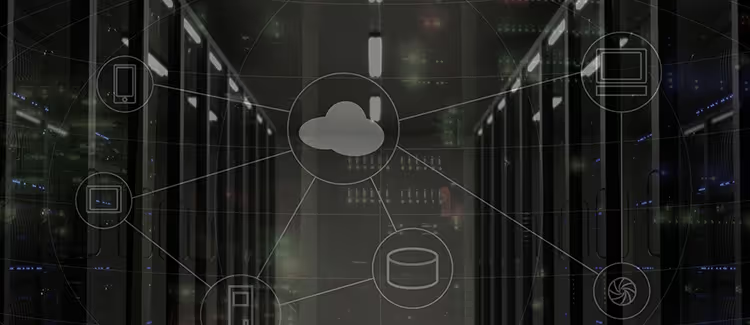
According to a study by Verizon, small-scale data loss (100 records) cost businesses an average of $18,120 to $35,730 and large-scale data loss (More than 100 million records) costs a business a whopping $5 million to $15.6 million. In North America, 56% of enterprises do not have disaster recovery services to mitigate the risk.
Many businesses have realized the threat and cost of such small and largescale data losses. Businesses are now securing their real-time data against the possible data loss risk by either building applications or migrating current applications onto cloud Application. Let's learn what are the widely used cloud application services and the benefits they bring to the table.
Cloud Application Services:
In simple terms, a cloud application service is a cloud-based program that works with other components to safely host a company's application data on the cloud. From a user perspective, a cloud application looks like a typical app or a website, all the data processing is done by cloud using API (Application Program Interface).
There are a plethora of cloud hosting services and the best known are AWS, Google Drive, Microsoft Azure, and iCloud. Their large data centers are ensured with security, storage capacity, and other computational needs to store all the information in an ordered and secure manner.
How do Cloud Application Services work?
Companies can store, access, and download data from the cloud and work on it by choosing any available device. The added benefit of a cloud application is that companies can work simultaneously with another user without any issues, making it easy to work remotely.
Cloud Application delivers many computing services such as databases, storing information, providing servers to store data, help businesses make insightful decisions by accessing any amount of data, etc.
Cloud Application Categories:
SaaS: Software as a Service
With SaaS, a popular and commonly used category of cloud applications, the cloud service provider not only gives infrastructure but also supplies a software application to users. Approximately 24% of all enterprise workloads (up from 14% in 2016) use SaaS. SaaS delivers its applications which are managed by the 3rd party vendors, via the web.
Most of the SaaS applications can be used without downloading or installing. Though some applications require extra plugins to work with. With SaaS, users can manage emails and CRMs with ease and accessibility.
Example: Google Apps, Salesforce, and Cisco WebEx
IaaS: Infrastructure as a Service
IaaS is one of the layers of the cloud computing platform where the 3rd party cloud provider supplies the user with infrastructure such as servers, storage, and networking along with the required support.
The user rents IaaS for a required amount of time along with some predefined hardware configuration and pays for the usage. IaaS allows many users to gain access to data over the internet.
Examples: Amazon Web Services (AWS) and Microsoft Azure
PaaS: Platform as a Service
PaaS is especially useful for designers building an application. Here the cloud provider supplies the designer with development tools, infrastructure, and operating systems on rent.
Using PaaS designers can get a framework that they can develop further and customize the application to suit their needs. It simplifies web application development for the designers.
Examples: AWS Elastic Beanstalk, Force.com, Windows Azure Now comes the part where a company can choose a cloud that suits its business needs and there are 3 types they choose from:
Choosing a Cloud
Public Cloud:
This service can be shared among multiple businesses. Companies that use public cloud deliver on-demand computing services to a variety of customers who can gain access to it with any device.
Private Cloud:
As the name suggests, a private cloud is owned by a single business and is not shared by others. Large businesses can build their own cloud or can choose a 3rd party to host them.
Hybrid Cloud:
This is a combination of both the public and private clouds. Also, it has the advantages of both the clouds combined depending on the user who can avail them both.
Benefits of Cloud Application Services:
- Quick Response: The user can access, update, and test any application quickly without any interruptions.
- Low Costs: Cloud applications can be deployed quickly and without any additional infrastructure costs.
- Accessible: The user can access the cloud application from anywhere and anytime and on any device.
- Reliable: The user gets access to many resources and applications can be scaled quickly without any additional costs.
- Back-up: Cloud applications can be used offline and then synced when the device is online.
- Security: They provide a fully secured environment and also on-site protection.
Importance of Having the Right Cloud Service Provider:
As companies are rapidly adopting cloud services to store and manage their data, they are always looking for a cloud service provider that can provide robust data management with 24/7 accessibility and high security.
However, it is important for a company to choose the right cloud service provider to ensure that they manage their day-to-day work without any hassle, reduce their IT costs, and don’t fall prey to cyber-attacks or data losses. A good service provider has to fulfill the following features:
- The service provider should help the company migrate to the cloud with ease
- The cloud service should be flexible to meet the company’s growing demands of expansion
- The service should have high security to protect the company’s confidential data
- The service chosen should be affordable and the company should only pay for what they use
- The service should have fast uptime, low downtime, and full disaster recovery options to ensure there is zero loss of data
Fission Labs is a registered cloud consulting partner of AWS, Google Cloud, and Microsoft Azure. They provide the best of the class cloud management solutions that are customer-centric and help businesses stay ahead of the competition.
We also provide automation services using AI and ML, help businesses make data-driven decisions using data and analytics, developing web and mobile applications for all kinds of devices, provide software testing services, and help businesses stay ahead of the competition with their enhanced Salesforce CRM services. Contact Us Today.



